I’ve heard blogging alluded to two or three times as of late as a blend between a craftsmanship and a science. On the off chance that this is valid (and I think it is), there’s no ‘right route’ to approach blogging in the event that you need to be fruitful. There are a lot of individuals who’ve made an incredible showing with regards to of it however, and I thought it is helpful to gain from them.
These sixteen bloggers shared one crucial tip each for blogging novices. No doubt, even in case you’re no longer a amateur these suggestions will probably prove to be beneficial.
1. Get ideas from your audience
Create blog posts that answer the most interesting questions from people you engage with on social media.
(Dave Larson, founder of @ tweet smarter)
This may be a top notch manner to gather ideas of what topics people would maximum want to study approximately, with the intention to assist your weblog develop! One of the exceptional ways I’ve visible this in movement is thru blog feedback or Tweets. In one instance, right here on Fast Company quite a few people requested a put up that functions greater ladies marketers.

Now, a few weeks later adding such an article where just women contributed and built great businesses was a big hit.

2. Understand your audience
Understand your audience better than they understand themselves. It takes a lot of upfront research, and often means being a member of the very tribe you’re trying to lead – but it pays off.
(Brian Clark, founder and CEO, Copy blogger)
Understanding your audience higher method you’ll have a better concept of what weblog content material will resonate with them, which is a great start while you get to writing blog posts.
A tremendous technique for doing that is to in reality ask your readers first on Twitter, Facebook or LinkedIn with an interesting quote. If people reply nicely to it, than this is probably a tremendous subject matter to put in writing about. An instance for this comes from Andrew Chen who famously “exams” his BlogSpot ideas on Twitter first.
And so does Joel here at Buffer. Take this example from a current Twitter post of his, wherein he truly tweeted one quote to see how well people appreciated a topic earlier than he blogged about it.
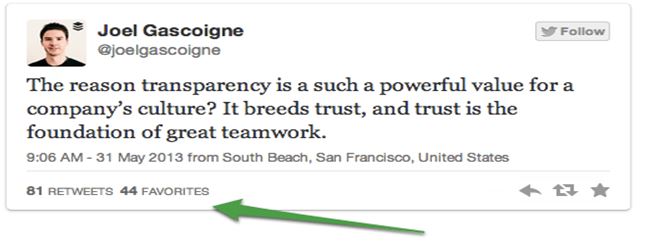
3. Write for yourself first
Write for yourself first & foremost. Ignore the fact that anyone else will read what you write; just focus on your thoughts, ideas, opinions and figure out how to put those into words. Write it and they will come.
(Adii Pienaar, founder of PublicBeta)
Adii’s experience in writing for himself firstly has made a difference to his blog in ways he didn’t expect:
Yes, since I’ve been writing for myself, I’ve found that I write more and I publish more often. I think though that the main reason for that is that I don’t decide whether to publishing something based on the traction / reception that the post will receive within my audience; instead if I want to publish something, I do so. For myself.
4. Build your email list
Start building your email list from day one. Even if you don’t plan on selling anything, having an email list allows you to promote your new content to your audience directly without worrying about search rankings, Facebook EdgeRank, or other online roadblocks in communications.
(Kristi Hines, freelance writer and professional blogger)
When you’re asking readers to enroll in your e-mail list, you may want to strive experimenting with special language. Willy Franzen observed that his subscription charge jumped 254% better while he modified his name-to-action from “subscribe by way of e mail” to “get jobs through e-mail”.
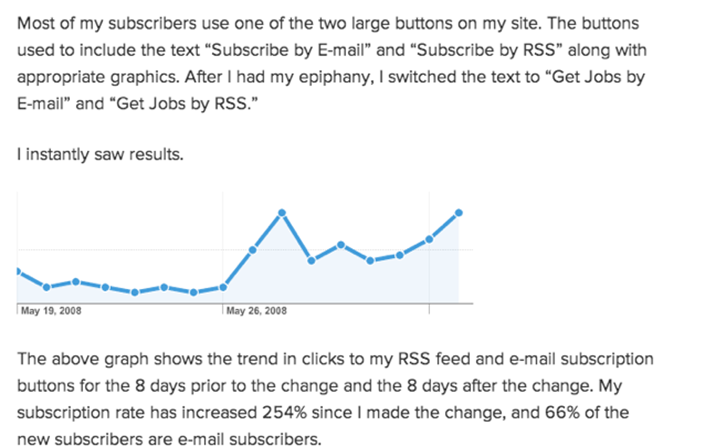
5. Love your existing readers
Love the readers you already have. A lot of bloggers get quite obsessed with finding new readers – to the point that they ignore the ones they already have. Yes – do try to find new readers but spend time each day showing your current readers that you value them too and you’ll find that they will help you grow your blog.
(Kristi Hines, founder of ProBlogger)
Focusing on your readers is a tremendous way to get to understand them better (see tip #2). I love the manner Daniel Burstein describes blog readers’ expectations of you as a blogger:
A blog is surely matters. One, truly a chunk of era, a platform. But, two, it’s miles a promise within the minds of maximum readers, who count on that the blog have to have actual content with a few elements of cost that is hyper-focused to their needs. Much like with a newspaper. Readers don’t just examine a newspaper as newsprint this is introduced on their driveway each morning. They look at it as precious data about their city, in which they live, and the matters that they do.
6. Focus on building an amazing call-to-action
I screwed up for years. I’d blog and blog. Some of my posts were doing very well on places like Hacker News, but I had such hard time getting return visitors. And very few people bothered to follow me on Twitter.
Don’t rely on people to do the work to find your Twitter account. Don’t rely on them to do the work to find your details in a sidebar. People are blind to sidebars. Thanks banner ads!
Finish your blog post with some kind of call to action to signup for an email list or follow you on Twitter. When I started doing this, I immediately increased my Twitter followers by 335% in the first 7 days.
(Nate Kontny, founder of Draft)
Nate uses a simple call-to-action on his blog now, that looks like this:

This precise technique we’ve additionally examined right here at the Buffer weblog and observed it to work amazingly nicely to deliver interest to different blog posts we’ve written, like this.

7. Give stuff away
Give away free content that adds value to people’s lives “until it hurts” and they will love you and become loyal fans.
Jeff Bullas, blogger and author of Blogging the Smart Way
A exceptional instance of this is the research finished via Incentivibe, who located that adding a giveaway contest pop-as much as the bottom-right of their website caused one hundred twenty five% extra email subscribers.
8. Be consistent
Consistency is one of the most important things that bloggers tend to forget. It’s much easier to lose your traffic than it is to build it up, so make sure you consistently blog.
(Neil Patel, founder of KISSmetrics)
A take a look at by way of Hubspot confirmed that constant blogging simply leads to better subscriber growth charges:
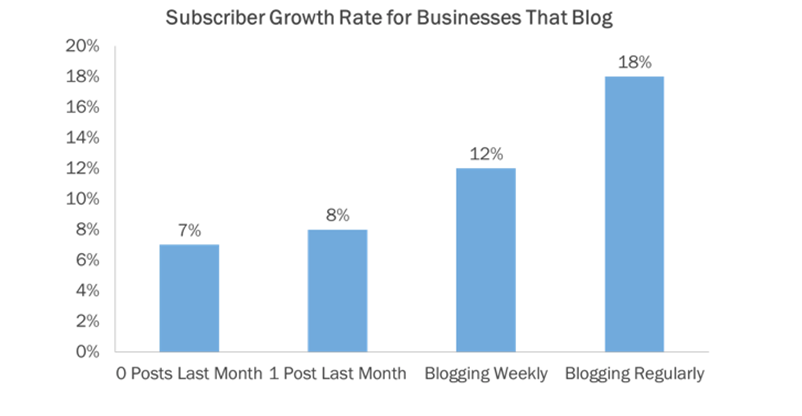
9. Give away your knowledge
Don’t be afraid to showcase what you know. Too many bloggers hold back the good stuff out of fear of giving away the “secret sauce.” There is no secret sauce in a world where everyone has high speed Internet access at all times. Today, you want to give away information snacks to sell knowledge meals.
(Jay Baer, author of Youtility)
Jay’s recommendation is to percentage the expertise you’ve got, rather than retaining it tucked away for a wet day. Chris Guillebeau follows this recommendation via supplying two loose, downloadable PDFs to his readers. Chris also does what Jay calls giving away “facts snacks to sell knowledge meals.” On both of the unfastened PDF down load pages, Chris markets his e-book at the proper-hand side.

10. Be true to your voice
Stay true to yourself and your voice. People don’t care to follow sites so much as they care to follow people.
Chris Pirillo, founder and CEO, LockerGnome
Another blogger who advocates the importance of the author’s voice is Jeff Goins. He says that your voice is the maximum vital, yet over-appeared part of blogging:
Writing isn’t about selecting the right subject matter; it’s about locating the right voice. What topics, what readers in reality resonate with, isn’t so much what you are saying, however how.
11. Give it time – This is why
Plan to invest in blogging for a long time before you see a return. The web is a big, noisy place and unless you’re willing to invest more over a greater period of time than others, you’ll find success nearly impossible. If you’re seeking short-term ROI, or a quick path to recognition, blogging is the wrong path. But if you can stick it out for years without results and constantly learn, iterate, and improve, you can achieve something remarkable.
(Rand Fishkin, CEO of Moz)
Rand shared those great snap shots with us from his wife’s travel weblog, Everywhereist, which indicates just how long it may take to peer a return to your efforts:


12. Give your email list priority
If you’re blogging to create a business, a movement, or to support a cause, then you need to build an email list. It’s not an option. I don’t even consider my blog to be my community, my email list is my community. Caring about these people, writing for them, and delivering value to them should be your number one goal.
James Clear, entrepreneur, weightlifter and travel photographer
When the New York Public Library focused on developing e mail subscription prices, this simple home web page layout with data about what readers may want to assume to acquire boosted numbers with the aid of fifty two.8% over a more complicated model with much less statistics about the real newsletter:
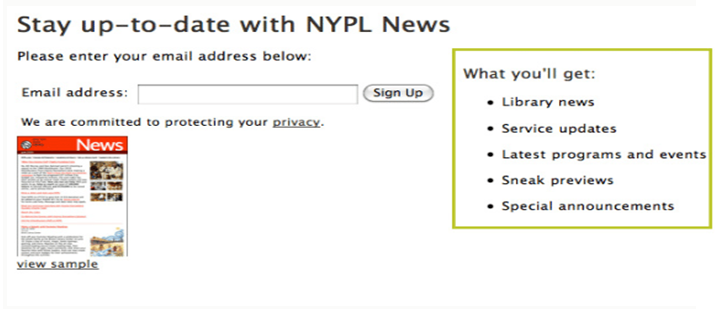
13. Write catchy headlines
No matter how great your content is, it won’t matter unless you have an amazing headline. People have a split second to decide if they should click on your post, and your headline will make them decide. The headline is also essential in making it easy and desirable for people to share your post. Keep your headlines SPUB: simple, powerful, useful and bold.
(Dave Kerpen, author and CEO of Likeable Local)
Something we do at Buffer is to check several different headlines for each of our weblog posts to determine which of them works quality. Here’s an example of what that might look like:
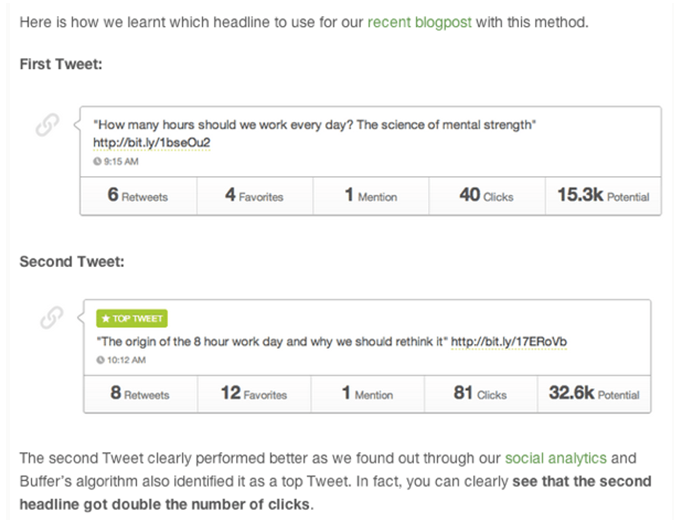
14. Be Yourself
There isn’t one specific set of rules to be successful in blogging. When I started blogging, I had the opportunity to learn from experienced and successful bloggers in the industry. One of the best lessons I’ve learned from them is to simply be me. I didn’t have to be too “professional” or use “big words” to impress others. I had to simply be me.
By being me, I enjoyed writing and the process more. It had me writing more than I usually would too. If you look at the the most successful writers like Seth Godin and Chris Brogan you’ll notice that they are different and unique in their own ways.
Aaron Lee, social media manager, entrepreneur and blogger
Moz CEO Rand Fishkin consents that telling your business enterprise’s story is important, in place of following a method for a success blogging:
Emotion and storytelling have been part of how we speak with every different and encourage motion for hundreds of years.
15. Keep it short
Biggest lesson I learned in my past year of blogging. Keep it in the 1–2 minutes read-time length.
Derek Sivers, founder of Wood Egg
Working out the first-class length on your weblog posts may be complicated. You normally need about three hundred phrases minimum to get listed by means of serps, however otherwise the period of your put up is up to what you observed feels first-class.
Derek Sivers observed recently that his shorter posts had been much higher obtained by using readers and appeared to be shared greater, unlike his longer posts:
- When I’ve written articles that have been too long or had too many ideas, they didn’t get a good deal of a response.
- When I examine books, I regularly feel terrible for the exquisite concept buried on page 217. Who will hear it?
- Stop the orchestra. Solo that motif. Repeat it. Let the alternative gadgets construct upon it.
- The web is such a exquisite manner to try this.
- Present a single concept, one at a time, and allow others construct upon it.
According to this Chart beat graph beneath, many site visitors in your website online received’t bother scrolling, and most traffic received’t examine greater than approximately 60% of what you’ve written. Keeping it quick and sharp then, can be profitable.
 An Entrepreneur Blog Management, Strategy, Internet, Technology, Social Networks, Organizational Change and more!
An Entrepreneur Blog Management, Strategy, Internet, Technology, Social Networks, Organizational Change and more!




